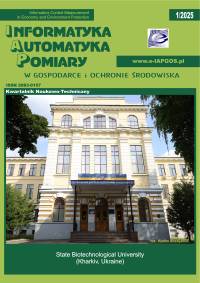DETEKCJA MIGOTANIA PRZEDSIONKÓW NA ELEKTROKARDIOGRAMACH Z WYKORZYSTANIEM KONWOLUCYJNEJ SIECI NEURONOWEJ
Viktor Kifer
Ternopil Ivan Puluj National Technical University (Ukraina)
http://orcid.org/0000-0002-0621-9121
Natalia Zagorodna
zagorodna.n@gmail.comTernopil Ivan Puluj National Technical University (Ukraina)
http://orcid.org/0000-0002-1808-835X
Olena Hevko
Ternopil Ivan Puluj National Technical University (Ukraina)
http://orcid.org/0000-0003-1427-1699
Abstrakt
W tej pracy, przedstawiamy nasze badania, które potwierdzają przydatność zastosowania konwolucyjnych sieci neuronowych dla klasyfikacji zapisów jedno-odprowadzeniowego EKG. (tak brzmi ta nazwa). Proponowana metoda została zaprojektowana dla klasyfikowania prawidłowego rytmu zatokowego, migotania przedsionków (AF), poza-AF powiązanych z innymi nieprawidłowymi rytmami serca i zaszumionymi (głośnymi?) sygnałami. Ta metoda łączy cechy wyselekcjonowane ręcznie z cechami wyuczonymi przez głębokie sieci neuronowe. Zbiór danych Physionet Challenge 2017 zawierający ponad 8500 zapisów EKG został zastosowany dla modelu szkolenia oraz walidacji. Model nauczony (wyszkolony?) osiąga odpowiednio średni F1-wynik 0.71 w klasyfikowaniu prawidłowego rytmu zatokowego, rytmu AF oraz innych rytmów.
Słowa kluczowe:
elektrokardiografia, nauczanie maszynowe, sieci neuronoweBibliografia
AliveCor ECG recording device. https://www.alivecor.com
Google Scholar
Clifford G, Liu C, Moody B, Silva I, Li Q, Johnson A, Mark. R.: AF classification from a short single lead ECG recording: the PhysioNet Computing in Cardiology challenge 2017. Computing in Cardiology 44, 2017, [DOI: 10.22489/CinC.2017.065-469].
DOI: https://doi.org/10.22489/CinC.2017.065-469
Google Scholar
Dilaveris P. E., Kennedy H. L.: Silent atrial fibrillation: epidemiology, diagnosis, and clinical impact. Clinical Cardiology 40(6), 413–418, 2017.
DOI: https://doi.org/10.1002/clc.22667
Google Scholar
Hernandez J., Carrasco-Ochoa J. A., Martínez-Trinidad J. F.: An Empirical Study of Oversampling and Undersampling for Instance Selection Methods on Imbalance Datasets. In: Ruiz-Shulcloper J., Sanniti di Baja G. (eds): Progress in Pattern Recognition, Image Analysis, Computer Vision, and Applications. CIARP 2013. Lecture Notes in Computer Science, vol 8258. Springer, Berlin, Heidelberg 2013, [DOI: 10.1007/978-3-642-41822-8_33]
DOI: https://doi.org/10.1007/978-3-642-41822-8_33
Google Scholar
Himanshu S., Kumar J. S. J, Ashok V., Juliet A. V.: Advanced ECG Signal Processing using Virtual Instrument. International Journal on Recent Trends in Engineering & Technology 3(2), 2010, 111-114.
Google Scholar
Huang J., Chen B., Yao B., He W. ECG Arrhythmia Classification Using STFT-based Spectrogram and Convolutional Neural Network. EEE Access 7, 2019, 92871-92880.
DOI: https://doi.org/10.1109/ACCESS.2019.2928017
Google Scholar
Kohler B.-U., Hennig C., Orglmeister R.: The principles of software QRS Detection. IEEE Engineering in Medicine and Biology Magazine 21(1), 2002, 42-57, [DOI: 10.1109/51.993193].
DOI: https://doi.org/10.1109/51.993193
Google Scholar
Mikhled A., Daqrouq K.: ECG Signal Denoising by Wavelet Transform Thresholding. American Journal of Applied Sciences 5(3), 2008. 276-281.
DOI: https://doi.org/10.3844/ajassp.2008.276.281
Google Scholar
Park J., Lee S., Jeon M.: Atrial fibrillation detection by heart rate variability in Poincare plot. Biomed engineering online 8/38, 2009, 1-12.
DOI: https://doi.org/10.1186/1475-925X-8-38
Google Scholar
Petrenas A., Marozas V.: Low-complexity detection of atrial fibrillation in continuous long-term monitoring. Comput in Biology and Medicine 65, 2015, 184-191.
DOI: https://doi.org/10.1016/j.compbiomed.2015.01.019
Google Scholar
Rodenas-Garcia J., Garica M., Alcaraz R., Rieta J.: Wavelet Entropy Automatically Detects Episodes of Atrial Fibrillation from Single-Lead Electrocardiograms. Entropy 17, 2015, 6179-6199, [DOI: 10.3390/e17096179].
DOI: https://doi.org/10.3390/e17096179
Google Scholar
Simonyan K., Zisserman A.: Very Deep Convolutional Networks for Large-Scale Image Recognition. Inter Conf on Learning Representations (ICLR), 2015. [arXiv preprint arXiv:1409.1556].
Google Scholar
Tziakouri M., Pitris C., Orphanidou C.: Classification of AF and Other Arrhythmias from a Short Segment of ECG Using Dynamic Time Warping. Comp in Cardio, 2017, 1-4.
DOI: https://doi.org/10.22489/CinC.2017.348-295
Google Scholar
Velayudhan A., Peter S.: Noise Analysis and Different Denoising Techniques of ECG Signal – A Survey. IOSR Journal of Electronics and Communication Engineering, 2016, 40-44
Google Scholar
Wang Z., Wan F., Wong C.M., Zhang L.: Adaptive Fourier decomposition based ECG denoising. Computers in Biology and Medicine 77, 2016, 195–205.
DOI: https://doi.org/10.1016/j.compbiomed.2016.08.013
Google Scholar
https://keras.io Keras documentation (available: 19.07.2019).
Google Scholar
https://numpy.org NumPy official documentation (available 01.07.2019).
Google Scholar
https://scikit-learn.org Scikit-Learn official website (available: 01.07.2019).
Google Scholar
https://www.python.org Python programming language (available 30.06.2019).
Google Scholar
https://www.scipy.org SciPy official documentation (available 01.07.2019).
Google Scholar
https://www.tensorflow.org Tensorflow official page (available: 19.07.2019).
Google Scholar
OMRON HCG801 HearnScan ECG recorder. https://www.omron-healthcare.com/en/products/electrocardiograph
Google Scholar
WIWE ECG recording device. https://shop.mywiwe.com/en/ecg-recording-105
Google Scholar
Autorzy
Viktor KiferTernopil Ivan Puluj National Technical University Ukraina
http://orcid.org/0000-0002-0621-9121
Autorzy
Natalia Zagorodnazagorodna.n@gmail.com
Ternopil Ivan Puluj National Technical University Ukraina
http://orcid.org/0000-0002-1808-835X
Autorzy
Olena HevkoTernopil Ivan Puluj National Technical University Ukraina
http://orcid.org/0000-0003-1427-1699
Statystyki
Abstract views: 582PDF downloads: 250
Licencja

Utwór dostępny jest na licencji Creative Commons Uznanie autorstwa – Na tych samych warunkach 4.0 Miedzynarodowe.









